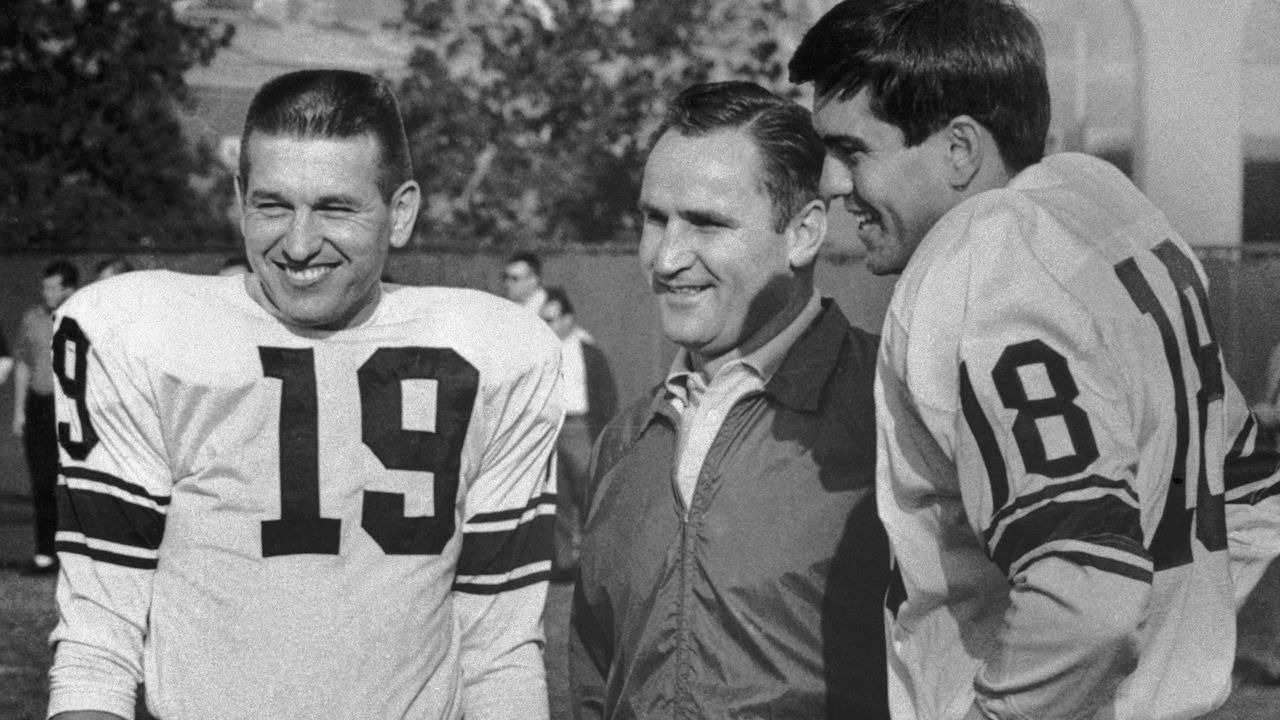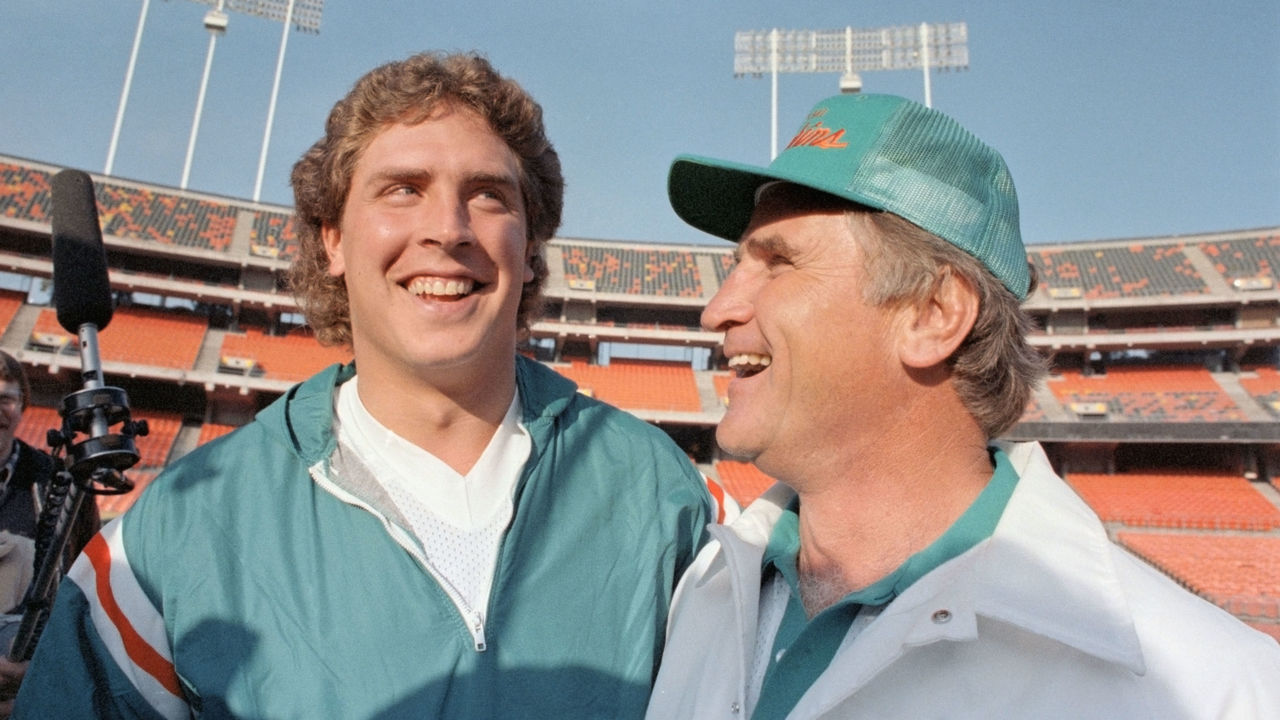What Don Shula knew about winning
Much of Don Shula's legendary career speaks for itself. He won more games than any other NFL head coach. He orchestrated what remains the only perfect season in league history. He persisted across multiple eras. What's harder to pin down is exactly how he did it.
Most of the NFL's greatest coaches make an indelible mark on the game. Paul Brown was an offensive innovator. Vince Lombardi created the Packer Sweep. Bill Walsh cooked up the West Coast offense. Bill Belichick adjusts better than anyone, but he also consistently builds a roster that maximizes value and depth. What was it about Shula, who died Monday the age of 90, that set him apart?
Shula retrospectives tend to describe him as an old-school taskmaster with a temper. His single-minded devotion to his work was so strong he asked his late first wife to run backward on the beach during their honeymoon, just to see what kind of athleticism she might be able to pass on to their children. But a lot of coaches are martinets with tunnel vision who like to yell at people.
The Shula Method was more intricate, more technical. The best clue can be found in an NFL Films compilation video of his most overlooked triumph: the Dolphins' victory against the Vikings in Super Bowl VIII. To counter Minnesota's fast, aggressive defensive line, Shula developed a run-blocking scheme that included cross-blocks, traps, and misdirection. Quarterback Bob Griese threw just seven passes while running back Larry Csonka rushed for 145 yards and two touchdowns. Miami won 24-7.
"Throughout all these plays, the theory was not only that Minnesota's defensive line could be negated by using its speed against itself, though that was one more common constraint," Doug Farrar wrote in his 2018 book "The Genius of Desperation: The Schematic Innovations That Made The Modern NFL." "Shula and his staff also devised ways in which the veteran acumen of the Purple People Eaters could be used to their advantage."
 Johnny Unitas, Don Shula, and Roman Gabriel at the 1967 Pro Bowl. Bettmann Archives / Getty Images
Johnny Unitas, Don Shula, and Roman Gabriel at the 1967 Pro Bowl. Bettmann Archives / Getty ImagesSeriously, watch and listen as Shula narrates how the Dolphins executed this to perfection. It's not the kind of stuff that lends itself to easily digestible highlight clips. But it is the sort of strategic maneuvering that's foundational to the way football is played, and Shula constantly found ways to tailor his schemes to changing circumstances. As time went on and the sport evolved, he adjusted from being run-heavy to pass-first. He coached for 33 seasons - a period of seismic changes in the NFL. Yet in all those years with the Baltimore Colts and Miami Dolphins, Shula had just two losing seasons, set 12 years apart.
There were the 347 career victories. There were the back-to-back Super Bowl titles with the Dolphins, including the 17-0 perfect season in 1972. There was the 1965 playoff game with running back Tom Matte serving as his emergency starting QB - a game the Colts lost because the lone official stationed below the goalposts wrongly judged a missed field goal to be good. There was the Super Bowl appearance with David Woodley as his quarterback. There was the Dolphins' 38-24 destruction of the otherwise invincible 1985 Bears. Dan Marino was sensational in that game, but Shula knew what Marino's quick release could do along with the schematic flourish of using three receivers to neutralize the Bears' ferocious pass rush.
But there were also profound disappointments. Shula's 1968 Colts lost to the Jets in Super Bowl III despite being 18-point favorites. And even though he had Marino to quarterback the league's most thrilling offense for more than a decade, the Dolphins from 1983-95 reached just one Super Bowl, suffering a blowout loss. Miami made the playoffs in three of his last four seasons, but Shula was gently pushed out anyway. In the end, he two won Super Bowls with Griese and Earl Morrall, but he failed to win one with Johnny Unitas and Marino.
Shula's demanding approach to coaching seems barbaric by today's standards: four-a-day practices without water in the unrelenting South Florida heat. But he genuinely cared for his players, too. Colts defensive back Rick Volk was hospitalized after being knocked out twice by hits to the head in Super Bowl III. Shula spent that night at the hospital with Volk and his wife, Charlene. "It says a lot (about) the type of person that he was," Charlene Volk said during "Don Shula: A Football Life," "that he was more concerned about the health of his players and their families than he was about the game that just happened."
 Dan Marino and Don Shula in an undated photo. Bettmann Archives / Getty Images
Dan Marino and Don Shula in an undated photo. Bettmann Archives / Getty ImagesOne other anecdote from that "Football Life" special: Csonka recalled the time he found a Raiders game plan inside his locker in Oakland the day before a game there. He gave it to an assistant coach. After the Dolphins lost to the Raiders, Csonka asked what happened. The assistant said Shula had told him to throw the game plan in the trash. "Shula," Csonka said, "won't cheat."
Shula was also responsible for rule changes to which he'd later have to adjust. As a longtime member of the NFL's competition committee, he worked to usher through two 1978 rules that were designed to benefit offenses and open up the game: a looser definition of what constitutes holding penalties on pass blocks, and restrictions that prevented defenders from bumping pass-catchers beyond 5 yards from the line of scrimmage.
Shula had won his championships behind a technically proficient offensive line that powered a three-back rotation, but he would soon build his offenses around Marino's ability to throw the ball all over the field. Don Shula always adapted because he had to adapt. He won more football games than anyone - and coached for as long as he did - because he knew how to adapt.
Dom Cosentino is a senior features writer at theScore.
Copyright (C) 2020 Score Media Ventures Inc. All rights reserved. Certain content reproduced under license.